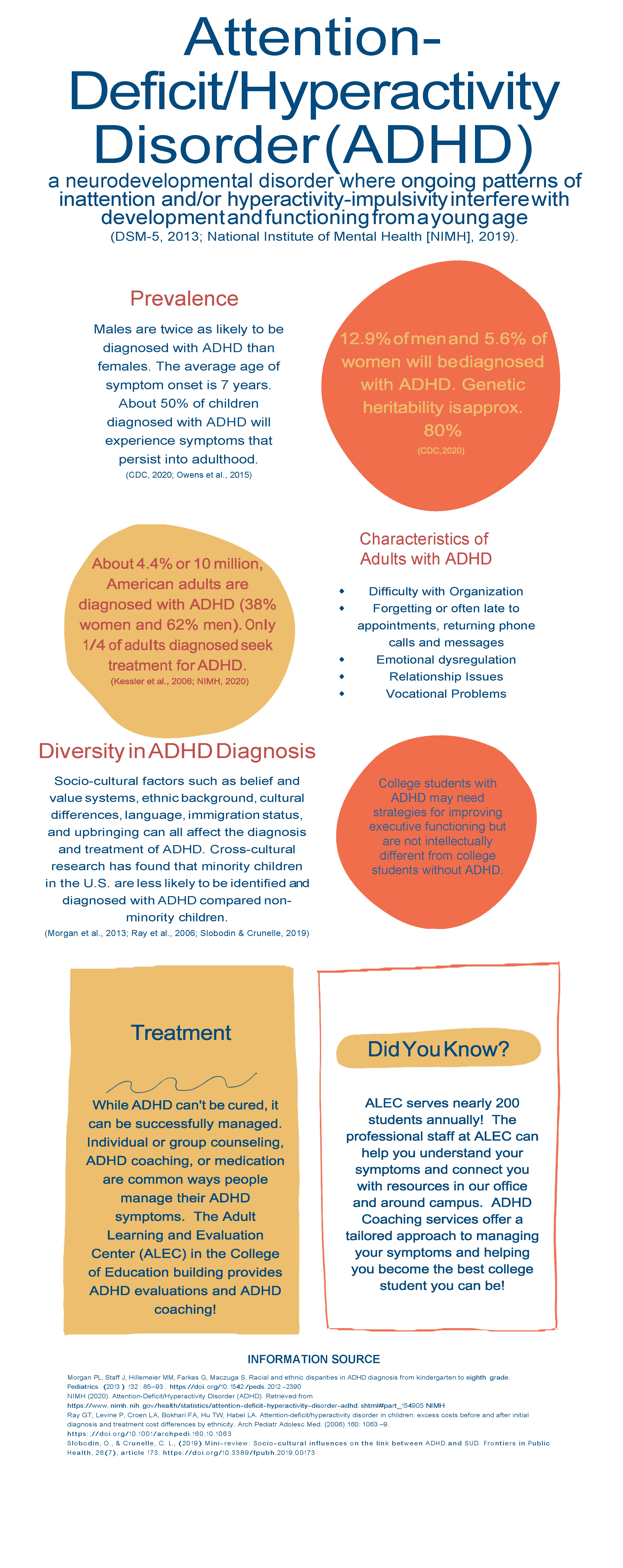 ADHD is a neurodevelopmental disorder where ongoing patterns of inattention and/or hyperactivity-impulsivity interfere with development and functioning from a young age (DSM-5, 2013; National Institute of Mental Health [NIMH], 2019).
ADHD is a neurodevelopmental disorder where ongoing patterns of inattention and/or hyperactivity-impulsivity interfere with development and functioning from a young age (DSM-5, 2013; National Institute of Mental Health [NIMH], 2019).
Prevalence
Males are twice as likely to be diagnosed with ADHD than females. The average age of symptom onset is 7 years. About 50% of children diagnosed with ADHD will experience symptoms that persist into adulthood.(CDC, 2020; Owens et al., 2015)
12.9% of men and 5.6% of women will be diagnosed with ADHD. Genetic heritability is approximately 80%. (CDC, 2020). About 4.4% or 10 million American adults are diagnosed with ADHD (38% women and 62% men). Only 1/4 of adults diagnosed seek treatment for ADHD. (Kessler et al., 2006; NIMH, 2020)
Characteristics of Adults with ADHD
- Difficulty with Organization
- Forgetting or often late to appointments, returning phone calls and messages
- Emotional dysregulation
- Relationship Issues
- Vocational Problems
College students with ADHD may need strategies for improving executive functioning but are not intellectually different from college students without ADHD.
Diversity in ADHD Diagnosis
Socio-cultural factors such as belief and value systems, ethnic background, cultural differences, language, immigration status, and upbringing can all affect the diagnosis and treatment of ADHD. Cross-cultural research has found that minority children in the U.S. are less likely to be identified and diagnosed with ADHD compared non-minority children. (Morgan et al., 2013; Ray et al., 2006; Slobodin & Crunelle, 2019)
Treatment
While ADHD can't be cured, it can be successfully managed. Individual or group counseling, ADHD coaching, or medication are common ways people manage their ADHD symptoms. The Adult Learning and Evaluation Center (ALEC) in the College of Education's Stone Building provides ADHD evaluations and ADHD coaching.
Did You Know?
ALEC serves nearly 200 students annually! The professional staff at ALEC can help you understand your symptoms and connect you with resources in our office and around campus. ADHD coaching services offer a tailored approach to managing your symptoms and helping you become the best college student you can be.
Sources
Morgan PL, Staff J, Hillemeier MM, Farkas G, Maczuga S. Racial and ethnic disparities in ADHD diagnosis from kindergarten to eighth grade. Pediatrics. (2013) 132 : 85–93. https://doi.org/10.1542/peds.2012-2390
NIMH (2020). Attention-Deficit/Hyperactivity Disorder (ADHD). Retrieved from https://www.nimh.nih.gov/health/statistics/attention-deficit-hyperactivity-disorder-adhd.shtml#part_154905 NIMH
Ray GT, Levine P, Croen LA, Bokhari FA, Hu TW, Habel LA. Attention-deficit/hyperactivity disorder in children: excess costs before and after initial diagnosis and treatment cost differences by ethnicity. Archives of Pediatrics and Adolescent Medicine. (2006) 160: 1063 –9. https://doi.org/10.1001/archpedi.160.10.1063
Slobodin, O., & Crunelle, C. L., (2019) Mini-review: Socio-cultural influences on the link between ADHD and SUD. Frontiers in Public Health, 26(7), article 173. https://doi.org/10.3389/fpubh.2019.00173

